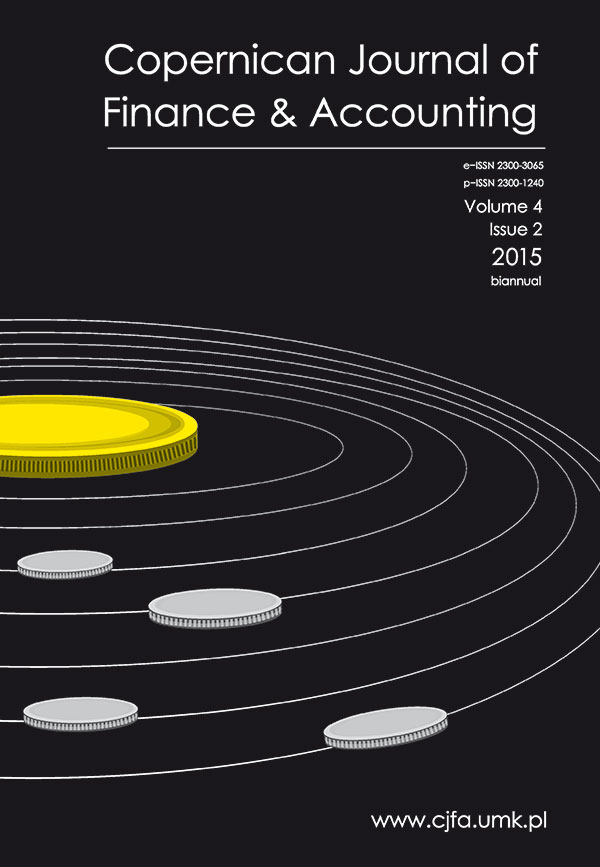Human motivation and corporate governance
DOI:
https://doi.org/10.12775/CJFA.2015.023Keywords
governance, economic growth, human resource motivationAbstract
In one stream of research, this paper assesses the effect that human motivation has on Corporate Governance Indicators. By doing this, we will use the six dimensions of corporate governance at country level and four dimensions of human motivation provided by OECD. The human motivation dimensions had been chosen considering the expectations theory of Vroom. The paper is organized into three main parts presenting if the chosen governance indicators have different predictors and different possible consequence that depend on human motivation. The idea that corporate governance should be gain by human motivation will be illustrated from an empirical point of view with data from twenty developed countries from Europe.
References
Acemoglu, D., & Robinson, J. A. (2012). Why Nations Fail: The Origins of Power, Prosperity, and Poverty. New York: Crown Business, 12–39.
Baron, R. M., & Kenny D. A. (1986). The Moderator-Mediator Variable Distinction in Social Psychological Research – Conceptual, Strategic, and Statistical Considerations. Journal of Personality and Social Psychology, 51(6), 1173–1182.
Beardsley, K. C., Quinn, D. M., Biswas, B., & Wilkenfeld, J. (2006). Mediation Style and Crisis Outcomes. The Journal of Conflict Resolution February, 50, 58–86. http://dx.doi.org/10.1177/0022002705282862.
Bradley, R. H., & Corwyn, R. F. (2004). Life Satisfaction among European American, African, American, Chinese American, Mexican American, and Dominican American Adolescents. International Journal of Behavioral Development, 28 (5), 385–400. http://dx.doi.org/10.1080/01650250444000072.
Clark, A. E. & Oswald, A. J. (1994). Unhainess and Unemployment. The Economic Journal, 104 (424), 648–659.
Collins, L. M., Graham, J. W., & Flaherty, B. P. (1998). An alternative Framework for Defining Mediation. Multivariate Behavioral Research, 33(2), 295–309. http://dx.doi.org/10.1207/s15327906mbr3302_5.
Colton, T. (1974), Statistics in Medicine. Little Brown and Company, New York.
Durbin, J., & Watson, G. S. (1950). Testing for Serial Correlation in Least Squares Regression. I. Biometrika, 37 (3–4), 409–428.
Goncalves, S. (2013). The Effects of Participatory Budgeting on Municipal Expenditures and Infant Mortality in Brazil. World Development. In press.
Herzberg, F. (1959). The motivation to Work, N-Y, John Wiley and Sons, 47.
Ionel Tampu, D. (2015). Vectors motivation of human capital – the dilemma endless crisis in Romania. Post Doctoral Thesis, 56–80.
Martikainen, L. (2008). The Many Faces of Life Satisfaction among Finnish Young Adults. Journal of Hainess Studies, 2, 19. http://dx.doi.org/10.1007/s10902-008-9117-2.
Maslow, A. H. (1943). A theory of Human Motivation. Psyhological Review, Harper & Row, 370–396.
McGregor, D. (1960). Human Side of Organization, McGraw-Hill, N.Z., 6.
Milgrom, P. R., & Roberts, J. (1992). Economics, Organization and Management (New Jersey: Prentice-Hall).
Mukaram, A. K. (2014). Good Governance: Pakistan’s Economic Growth and Worldwide Governance Indicators. Pakistan Journal of Commerce and Social Sciences, 8 (1),
– 271.
Osterloh, M., Frey, B.S., & Frost, J. (2001). Managing Motivation, Organization and Governance. Journal of Management and Governance, 5(3), 231–239. http://dx.doi.org/10.1023/A:1014084019816.
Preacher, J. K., & Hayes, A. F. (2008). Asymptotic and resampling strategies for assessing and comparing indirect effects in multiple mediator models. Behavior Research Methods, 40 (3), 879–891. http://dx.doi.org/10.3758/BRM.40.3.879.
Rodrik, D. (2008). Thinking About Governance in Governance, Growth, and Development DecisionMaking—Reflections by Douglass North, Daron Acemoglu, Francis Fukuyama, Dani Rodrik. Washington, DC: World Bank.
Spector, P.E. (1997). Job Satisfaction: Alication, Assessment, Causes, and Consequences. Thousand Oaks, California, Sage Publications.
Tompkins, J. (2002). Strategic Human Resources Management in Government: Unresolved Issues. Public Personnel Management, 3 (1), 95–110. http://dx.doi.org/10.1177/009102600203100110.
Vroom, V. H. (1964). Work and motivation. 1st ed., Jossey-Bass.
Williamson, O.E. (1985). The Economic Institutions of Capitalism: Firms, Markets, Relational Contracting (New York: Free Press).
Zhuang, J., De Dios, E., & Lagman-Martin, A. (2010). Governance and Institutional Quality and the Links with Growth and Inequality: How Asia Fares [in] Zhuang, J. (ed.) Poverty, Inequality, and Inclusive Growth in Asia: Measurement, Policy Issues, and Country Studies. London: Anthem Press and Manila: Asian Development Bank.
Downloads
Published
How to Cite
Issue
Section
Stats
Number of views and downloads: 746
Number of citations: 0



